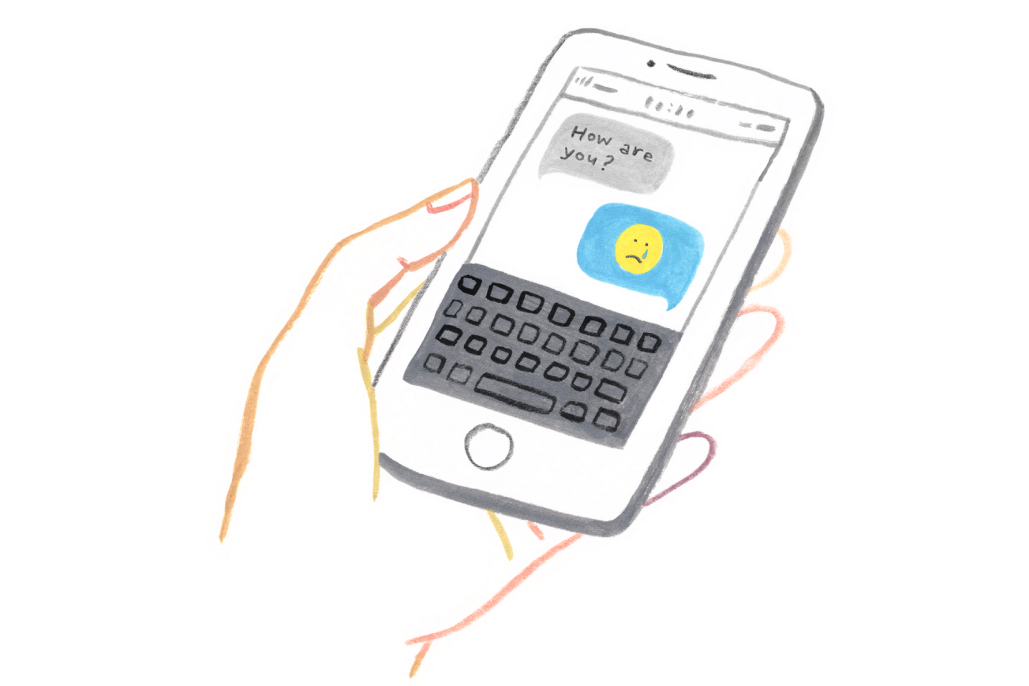You’ve seen the ads. Michael Phelps is doing it. Demi Lovato is doing it. Heck, even your uncle, your cousin, or your best friend might be doing it. But what exactly is text therapy and does it even work?
What is text therapy?
According to Psychreg, a popular online psychology resource, text therapy simply refers to a text-based interaction with a therapist. It usually works like this: A client sends a text message (rather than calling or visiting in-office or over video) to a therapist. The therapist responds a set number of times, say twice a day.
What does the research say?
Given that text and app therapy are relatively new modalities, there’s not a huge amount of conclusive research on its effectiveness or clinical benefit. But most of the data looks pretty good.
Surveys of adults using text therapy have shown that:
46% of respondents experienced symptom improvement from text-based therapy
83% of those who were severely depressed prior to treatment, saw improvement after using the app
A text-messaging-based intervention can be a safe, promising, and feasible tool to augment care for people with serious mental illness
But one thing nearly all the existing studies have in common is a small sample size. This means there’s a higher chance that the results are anecdotal rather than statistically reliable. So while it seems like the above studies all point to the idea that text therapy works well, the picture isn’t complete.
While reaching out to a trained therapist for help is undoubtedly a good idea, the style, format, and even timing of how that help is delivered is likely to have an impact on the long-term outcome of therapy.

For most people, that desired outcome is an improved ability to cope with difficult or challenging situations; to identify and treat any underlying mental illness; to develop the reasoning and resiliency skills to help set and maintain healthy boundaries; identify, sit with and move through powerful emotions into effective action; and better appreciate and even manage the complex emotional and psychological underpinnings of our behavior.
So while it seems like the above studies all point to the idea that text therapy works well, the picture isn’t complete.
Or, to put it simply, a common desired outcome of any form of therapy is a positive, lasting change in behavior—whether that behavior is outwardly obviously self-destructive (think addiction or disordered eating), or the less evident but just as diminishing negative self-talk that inhibits one’s ability to feel joy or to connect with others in a meaningful way.
The relationship matters
Traditionally, these positive changes are the result of a trusting relationship between a therapist and their patient. It requires a patient’s willingness to be vulnerable and to be open to trying new strategies and a therapist’s ability to listen to and identify a patient’s buried motives and feelings.
All of this is certainly possible via text, but the efficacy of face-to-face communication (be that in the same room or via video conferencing software) is time-tested over generations. Being literally seen by a therapist inspires that vulnerability that is so important to progress and nurtures the trust you’ll need to build from.

In fact, research has shown that the more solid the relationship between a person and their therapist, the more beneficial the results of that therapy will be. In this way, the relationship with a therapist is a lot like a relationship with another advisor like a lawyer or banker.
Would you negotiate an important business agreement like a job offer or the terms of a home loan via text? Maybe...But probably not.
It’s always a good idea to enlist help to work out thoughts, habits, feelings, or behaviors that may be holding you back. So far, the research tells us it’s best to commit to meeting with a trusted therapist at regular intervals. In real life.
Try Monarch
You don't have to be diagnosed with a mental illness to benefit from therapy. Many people seek therapy for common problems like a breakup or divorce.
However, for therapy to be effective, it's important that you find the right therapist—someone you trust and who has the experience to help you make positive changes in your life. With a network of over 100,000 therapists, Monarch makes it easy to find and book the right therapist.
Ben-Zeev, D., et al. (2020) Augmenting evidence-based care with a texting mobile interventionist: A pilot randomized controlled trial. Psychiatric Services. Retrieved from https://ps.psychiatryonline.org/doi/10.1176/appi.ps.202000239
DeAngelis, T. (2019). Better relationships with patients lead to better outcomes. APA Monitor. Retrieved from https://www.apa.org/monitor/2019/11/ce-corner-relationships
DellaCrosse, M., Mahan, K., & Hull, T. D. (2019). The effect of messaging therapy for depression and anxiety on employee productivity. Journal of Technology in Behavioral Science.
Hull, T.D. and Mahan, K. (Mar 2017). A study of asynchronous mobile-enabled SMS text psychotherapy. Telemedicine and e-Health, 240-247.
Marcelle, E. T., Nolting, L., Hinshaw, S. P., & Aguilera, A. (2019). Effectiveness of a multimodal digital psychotherapy platform for adult depression: A naturalistic feasibility study. JMIR mHealth and uHealth, 7(1), e10948. Retrieved from https://doi.org/10.2196/10948







